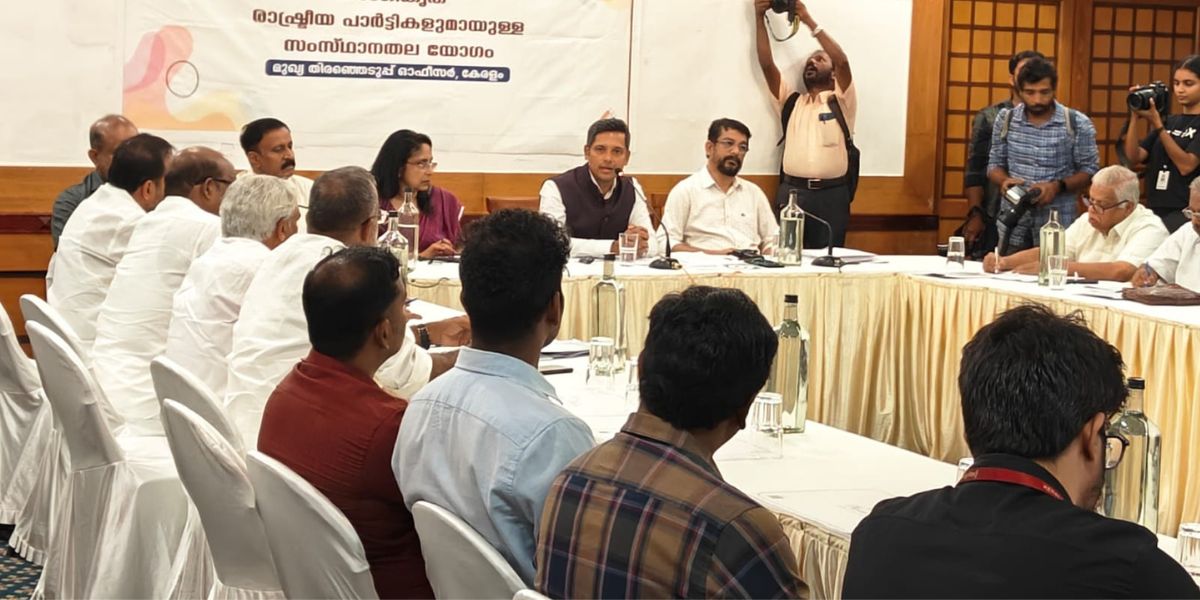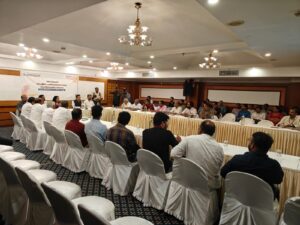Published Sep 20, 2025 | 8:47 PM ⚊ Updated Sep 20, 2025 | 8:47 PM

All-party meeting convened by CEO-Kerala regarding SIR implementation.
Synopsis: The move by Kerala Chief Electoral Officer to build consensus on rolling out a Special Intensive Revision of electoral rolls ran into turbulence with almost all political parties except the BJP opposing it.
A bid by Chief Electoral Officer (CEO) Rathan U Kelkar to build consensus on rolling out a Special Intensive Revision (SIR) of electoral rolls in Kerala ran into turbulence on Saturday, 20 September, with almost all political parties — barring the BJP — opposing the move.
While the CEO sought to allay fears, assuring that the Bihar-model SIR posed no threat, parties demanded that the Election Commission of India (ECI) defer the exercise in view of the upcoming local body polls and allow ration cards as valid documents.
During the all-party meeting, convened at the Mascot Hotel in Thiruvananthapuram, the CEO said that it has set in motion the groundwork for the SIR even as the ECI has yet to issue a formal schedule.
The SIR, last held in 2004, aims to address long-standing concerns raised by political parties regarding the accuracy and credibility of the voter list, particularly the inclusion of migrants, deceased persons and ineligible voters such as foreigners with dual citizenship.
The revision will ensure no eligible voter is excluded, while no ineligible person makes it to the rolls, the CEO stated.

It will involve house-to-house enumeration, publication of a draft list, claims and objections, verification of documents, and release of the final voter roll.
The 2002 list will be taken as the base document, and a pilot study conducted in Mannarkadu of the Palakkad district indicated that around 70 percent of voters from the 2002 list remain valid in 2025.
Parallelly, a rationalisation exercise will be undertaken to cap 1,100 voters per booth, requiring the creation of 6,321 new polling booths, since preliminary data shows 13,167 booths currently exceed the limit.
The CEO assured that the process will not hinder the upcoming local body polls, as the matter has been discussed with the State Election Commission, though concerns will be duly examined.
When asked whether ration cards would be accepted as valid proof, the CEO clarified that it would not be possible in light of the Supreme Court’s earlier ruling on the matter.
Meanwhile, the ruling LDF came out strongly against the move by the CEO to implement the SIR of the electoral rolls on the lines of the Bihar model. CPI(M) representative MV Jayarajan warned that such an exercise could disenfranchise large sections of genuine voters.
He alleged that even before the CEO convened an all-party meeting, District Electoral Officers in five districts — Kasaragod, Palakkad, Ernakulam, Kottayam, and Thiruvananthapuram — had already held discussions on the SIR.
“We have noticed that Booth Level Officers (BLOs) have been directed to compare the 2002 voter list with the 2025 list, sidelining Booth Level Agents (BLAs). This is unacceptable, as BLOs and BLAs must work together,” Jayarajan said.
He added that holding district-level meetings without wider consensus was “not appreciable.” The CPI(M) leader questioned the logic of taking 2002 as the base year.
“Voters who participated in five Lok Sabha and four Assembly elections since then will be forced to undergo enumeration again. Instead, the 2024 Lok Sabha election voter list should be treated as the base document, with grievances addressed separately,” he argued.
Stressing that while no ineligible voter should remain on the rolls, the greater concern was ensuring that no eligible voter was excluded, the LDF urged the Election Commission to reconsider its decision.
Supporting this stand, CPI representative K Raju sought clarity on removing migrants and settlers from the list, a concern echoed by Kerala Congress (M) representative K Anandakumar.
The Opposition UDF strongly objected to the way the ECI is implementing the “sanitisation of electoral rolls” (SIR) in Kerala, warning that it could trigger political controversies and create hurdles for the upcoming local body polls.
Congress MLA PC Vishnunath said the CEO failed to take political parties into confidence before rolling out such a sensitive process.
“It’s puzzling why the Commission wants to take the 2002 voter list as the base. Twenty-three years have passed. This is nothing but outdated data mapping. The CEO himself cited Bihar as an example. But for us, even the mention of Bihar generates fear, given the chaos witnessed there during SIR,” Vishnunath remarked.
He also flagged concerns over the plight of overseas voters, stressing that their rights must be safeguarded in the new system. Indian Union Muslim League (IUML) leader CP Cheriya Muhammad echoed the sentiment, stating that political parties were “not ready for SIR” and demanded that the CEO hold urgent discussions with the Election Commission of India to postpone the exercise.
Revolutionary Socialist Party (RSP) leader P Prasanna Kumar warned against rushing through the process, saying a hurried attempt could end up creating avoidable political controversies. UDF leaders stressed that the current approach lacked transparency and adequate preparation.
With the local body elections around the corner, they urged the CEO to slow down and build consensus before moving forward.
At the same time, the BJP in Kerala emerged as the lone political supporter of the SIR of voter lists, asserting its importance for electoral integrity.
During the meeting, BJP Kerala Vice-President B Gopalakrishnan welcomed the SIR, emphasising that doubts raised by other political fronts regarding its intentions are misplaced. He said that voter list reform is essential to ensure that only qualified citizens are included, while ineligible individuals are excluded.
“Being a citizen does not automatically mean having voted even once,” he said, adding that proper verification of citizenship documents is crucial for upholding national security.
He stressed the need to clearly define immigrants, noting that individuals coming from outside the country cannot automatically claim voting rights in India, and participation in upcoming polls does not confer citizenship.
Highlighting the role of political parties in supporting SIR, Gopalakrishnan urged trust in their cooperation to implement the exercise effectively. He also called upon the Election Commission to ensure mechanisms are in place to resolve differences and address concerns transparently.
Earlier, as part of the SIR campaign, the CEO held an online session with expatriate Malayalis on 19 September, organised through Norka Roots.
He detailed the process for adding names to the voter list, highlighting the facility for expatriates to submit Form 6A online. Representatives of global Malayali organisations raised queries, which Kelkar addressed, assuring that all eligible expatriates would be included in the voter list.
The meeting saw participation from the World Malayali Sabha and other expatriate groups, with Norka CEO Ajith Kollassery welcoming the attendees.
The proposed SIR in Kerala has sparked a sharp divide: While the BJP supports the exercise as crucial for electoral integrity, almost all other parties —including LDF and UDF — have raised concerns over its timing, methodology, and the choice of the 2002 voter list as the base.
The CEO also faces the uphill task of balancing voter list accuracy with political consensus, ensuring that no eligible voter is left out while maintaining transparency and trust in the process.
(Edited by Muhammed Fazil.)

